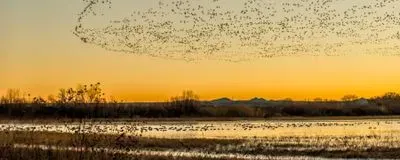ABOVE: © ISTOCK.COM, BOBBUSHPHOTO
Update (August 13): On August 11, a federal judge struck down the Trump administration’s interpretation of the Migratory Bird Treaty Act, ruling that the killing of protected species is prohibited even if it is unintentional.
Update (January 31): The US Fish and Wildlife Service announced yesterday that it plans to propose a rule defining the scope of the Migratory Bird Treaty Act on February 3, after which the public will have 45 days to comment on the proposed rule.
The Trump Administration will soon finalize a regulation that reinterprets a century-old law, allowing oil and gas companies to unintentionally kill protected birds without consequence, according to a New York Times article published today (January 30). The regulation would be the latest in a string of recent changes that weaken environmental protections enacted in previous administrations.
The Migratory Bird Treaty Act of 1918 prohibits the capture and ...














